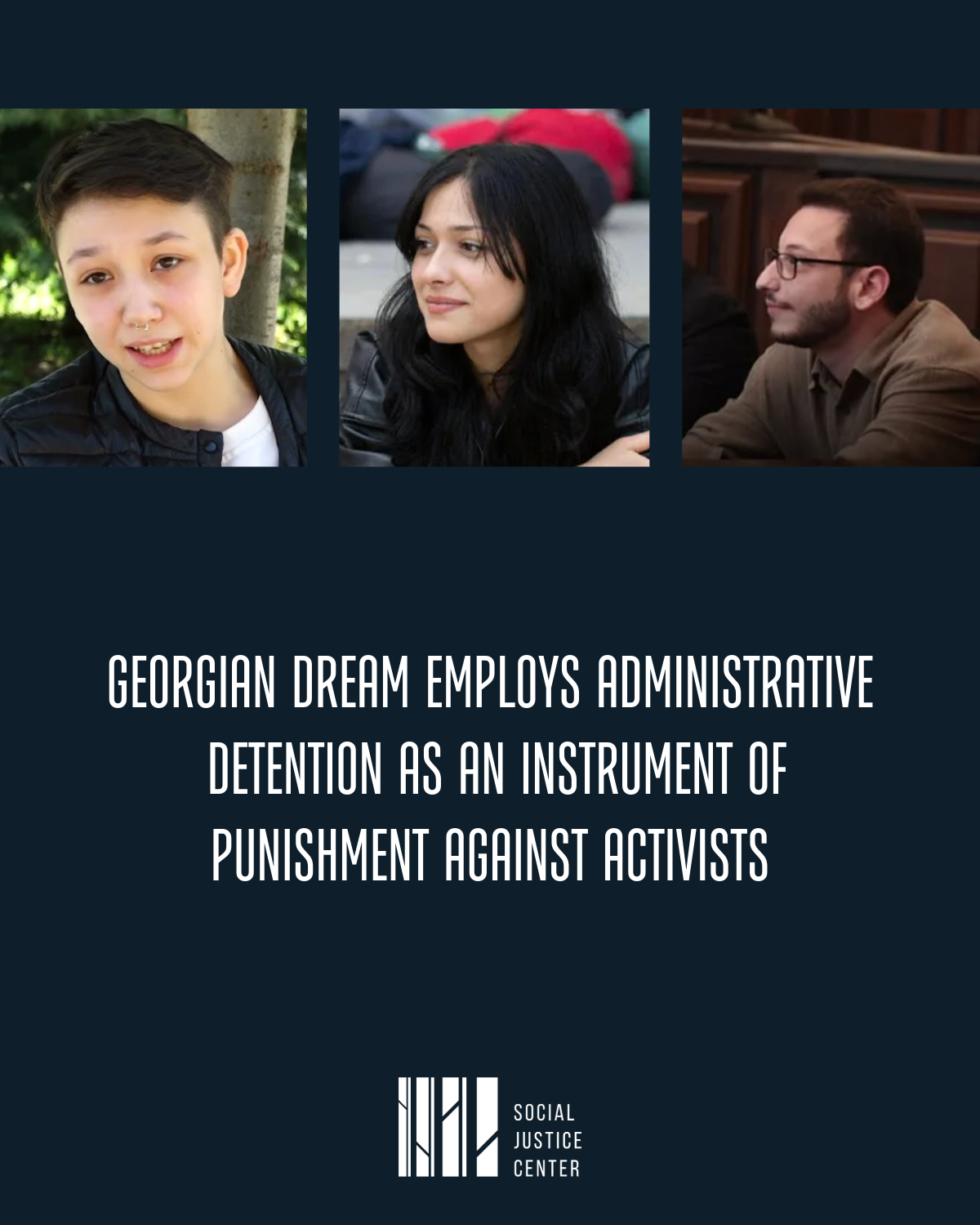საერთო ცხელი ხაზი +995 577 07 05 63


Social Justice Center comments on the cases of administrative detention of activists on May 30, 2025, and considers that imposing the harshest sanctions on activists, including women and young people, carries an intention of punishing them in an exemplary and demonstrative manner.
This is the case of an incident that occurred on May 17, 2025, in a Tbilisi cafe, where Mariam Lashkhi, a Georgian MP from Georgian Dream party, was sat with accompanying individuals, including her underaged children. On the same day, activists Tatia Apriamashvili and Magda Mamukashvili were in the close proximity from Lashkhi, and expressed their views using phrases like: “Freedom to the regime’s captives,” “No to the Russian regime,” “Down with Russia’s servants,” and “No to Russia’s servants.” The scene was also witnessed by a citizen Lika Lortkipanidze, who also expressed her disdain toward the Georgian Dream MP with the phrases: “Down with Russia’s servants, Georgian Dream (mentioned with derogatory acronym) servants.” Activist Tatia Apriamashvili was sentenced 12 days of administrative detention by Judge Davit Tetradze, as for Lika Lortkipanidze, she received the same sentence from Judge Manuchar Tsatsua. The court fined the third individual, Magda Mamukashvili 4 000 GEL, likely because she has a child under the age of 12, excluding the possibility of her administrative detention.
Imposing harsh administrative sanction upon female activists on May 30 hasn’t been the last case of the unjustified imposition of administrative detention. The very same day Judge Nino Enukidze sentenced Tornike Skhvitardze to 5 days of imprisonment. Tornike is the brother of Saba Skhvitardze—the detainee in the context of the winter protests. The second person involved in the incident, Ani Kavtaradze, was fined 5 000 GEL by the same judge. In this case, the court-declared offenders addressed one of the police officers involved in the criminal case, Mirian Kavtaradze, they called him “slave” and “a disgrace to the Kavtaradze name”.
The legal norm under which the activists were sentenced to imprisonment was added to the Code of Administrative Offenses in February 2025 as a result of expedited amendments. The norm establishes administrative liability for insulting, verbally or otherwise offending a public-political official. This amendment, just like other changes adopted during the same period, is used to punish individuals involved in political and civic protest and to utterly restrict their freedom of expression. Georgian Dream began applying this legal norm in case of a protest held outside Tea Tsulukiani’s residence.
The administrative proceedings against activists and the use of imprisonment as a punishment violates the freedom of expression enshrined in the Constitution of Georgia and protected by the European Convention on Human Rights. According to the practice of the European Court of Human Rights, the tolerable limits of criticism are broader towards public figures than towards private individuals. Unlike others, a politician inevitably and knowingly places themselves at the center of public attention, and therefore bears the duty of tolerating a higher degree of criticism. [1] The use of strong language, including potentially offensive expressions, is permissible when it is part of political debate or represents an opinion of an individual. [2]
Freedom of expression applies not only to those 'information' and 'ideas' that are received as positive, harmless or innocent, but also to those that may be offensive, shocking or disturbing. Such expression represents an essential foundation of a pluralistic society. [3] The court draws a clear line between incitement of hate and statements that simply offend, cause shock, or are unpleasant for the addressee. [4]
It shall be noted that the European Court of Human Rights has discussed the issue of calling law enforcement officers 'slaves' on multiple occasions, including in the context of Georgia. In the case of Chkhartishvili versus Georgia, the Court found violations of Article 11 (freedom of assembly) and Article 10 (freedom of expression) of the Convention. The court ruled that the imposition of a custodial sentence for non-violent actions was especially unjustifiable, and declared that domestic courts are obliged to sufficiently justify the application of the most restrictive measure—imprisonment. [5]
Georgian Dream continues to restrict the freedom of expression of protesters using various mechanisms, including the harshest sanction of them—imprisonment—which serves criminalization of the protest. The establishment of such practices by the justice system equals to the legalization of censorship, which ultimately aims to intimidate activists and repress the protest movement.
[1] ECtHR, Lingens v. Austria (application no. 9815/82), 1986, para 42.
[2] ECtHR, Francesco Minorini Mori v. Italy (application no. 53767/00), 2007, para. 58.
[3] ECtHR, Oberschlick v. Austria (application no. 11662/85), 1991, para. 63.
[4] ECtHR, Perinçek v. Switzerland (application no. №27510/08), 2015, para 197.
[5] ECtHR, Chkhartishvili v. Georgia (Application No. 31349/20, 2023, para. 59-60.
The website accessibility instruction